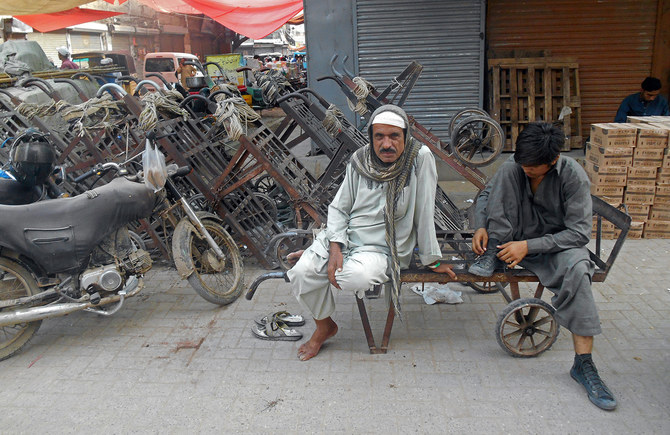KARACHI: Pakistani traders on Tuesday began a two-day shutter-down strike against the government’s tax policies, bringing business activities in major urban centers across the country to a grinding halt.
“Markets remained closed across Pakistan – from Khyber to Karachi and even Azad Kashmir – against the tax policies of the government,” Kashif Chaudhry, president of Markazi Tanzeem-e-Tajran Pakistan, told Arab News.
The Pakistan Tehreek-e-Insaf (PTI) administration that negotiated and secured a $6 billion bailout package from the International Monetary Fund (IMF) is currently introducing financial and tax reforms that are viewed by many as harsh and dictated by the international financial institution.

Otherwise a busy trading center, the Jodia Bazaar’s main market presents a deserted look on October 29, 2019, as traders observe a two-day strike against the tax policies of the government. (AN Photo)
The government is trying to achieve a revenue target of Rs5.5 trillion that has been fixed for the current fiscal year (FY20) and has been termed as both “ambitious and challenging” by the country’s central bank.
The documentation of the country’s economy and registration of traders for sales tax collection are moves that are being resisted by traders in Pakistan who complain that these demands cannot be met by semi-literate traders.
“Our demands are very simple,” Chaudhry said. “The condition of maintaining the record of Computerized National Identity Cards (CNIC) of customers on the purchase of Rs50,000 and the unnecessary documentation for sales tax registration must be withdrawn for small traders.”
Prime Minister Imran Khan and his administration has repeatedly insisted on pursuing its reforms agenda and declined to retreat despite mounting pressure.

Karachi’s biggest mobile market wears a deserted look as traders go on a shutter-down strike on October 29, 2019, against the government’s tax policies. (AN Photo)
Traders say the government’s stance has led to a stagnation of business activities across the country.
“The tax rates, sales tax registration and documentation are the main causes of concern to small traders,” Atiq Mir, chairman of Karachi Tajir Itehad, told Arab News. “The government must break this deadlock over the CNIC and the documentation requirement for small traders.”
As commercial activities come to a standstill across the county’s major markets, daily wage laborers are suffering the most since they live from hand to mouth in a depressed economic environment.
“Two year ago, I used to earn about Rs1500 per day. Now my daily income has reduced to about Rs500,” said Lal Bakhsh, a daily wage laborer, while sitting on his push cart. “This is not enough to run my family’s expenses. So I have to find more work.”
Traders maintain the business shut down for a day can cost an estimated Rs4 billion to the city of Karachi alone.

















